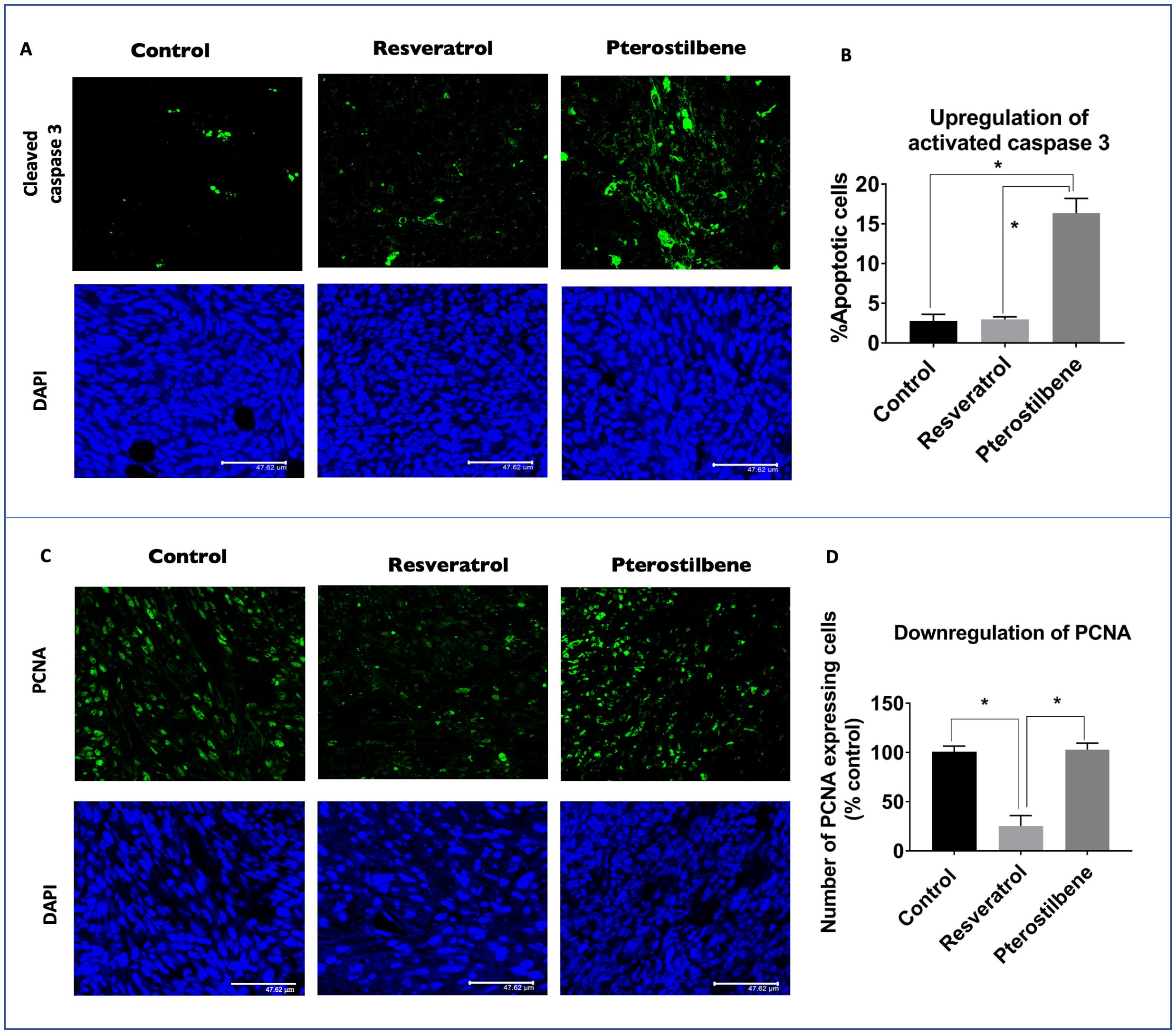- 1Doctoral Program in Biology, CUNY Graduate Center, New York, NY, United States
- 2Department of Biology, College of Staten Island, New York, NY, United States
- 3Doctoral Program in Biochemistry, CUNY Graduate Center, New York, NY, United States
- 4Department of Chemistry & The Center for Developmental Neuroscience, City University of New York at The College of Staten Island, New York, NY, United States
By Chatterjee K, Mukherjee S, Vanmanen J, Banerjee P and Fata JE (2019) Front. Oncol. 9:352. doi: 10.3389/fonc.2019.00352
In the published article, there was an error in Figure 5, Panel C as published. The control panels were not accurately represented. The corrected Figure 5 panel C and its caption: “(C) Tumor sections immunostained with PCNA protein (green) and counterstained with nuclear stain DAPI (blue). Resveratrol treated tumors display a significant decrease in PCNA expression compared to control sections. Pterostilbene treated tumors show similar PCNA levels as control. Scale bar: 47.62 μm.” appear below.

Figure 5. Upregulation of activated caspase 3 and downregulation of PCNA expression in mouse tumors. (A) Tumor sections immunostained with cleaved caspase 3 antibody shows elevated protein levels (green) in mice treated with pterostilbene when compared to control untreated tumors. Resveratrol treated tumors did not show any significant change in caspase 3 expression. Sections were counterstained with DAPI (blue). Scale bar: 47.62µm. (B) Graph indicates the significant increase of Cleaved caspase 3 expression levels in pterostilbene treated tumors in comparison to control tumors sections (mean ± S.E.M.; *p < 0.0001). (C) Tumor sections immunostained with PCNA protein (green) and counterstained with nuclear stain DAPI (blue). Resveratrol treated tumors display a significant decrease in PCNA expression compared to control sections. Pterostilbene treated tumors show similar PCNA levels as control. Scale bar: 47.62 μm. (D) Quantitative analysis of PCNA expression shows a significant change in resveratrol treated tumor sections (mean ± S.E.M.; *p < 0.0004; The two treatment groups show significant differences in PCNA expression (p < 0.0006).
The email of the corresponding author is no longer active. The correct email address of the corresponding author Kaushiki Chatterjee has been updated to a2F1c2gubWl0c0BnbWFpbC5jb20=.
The authors apologize for these errors and state that this does not change the scientific conclusions of the article in any way. The original article has been updated.
Publisher’s note
All claims expressed in this article are solely those of the authors and do not necessarily represent those of their affiliated organizations, or those of the publisher, the editors and the reviewers. Any product that may be evaluated in this article, or claim that may be made by its manufacturer, is not guaranteed or endorsed by the publisher.
Keywords: HPV E6 positive cervical cancer, natural product, resveratrol, pterostilbene, PCNA, caspase-3, VEGF, in vivo
Citation: Chatterjee K, Mukherjee S, Vanmanen J, Banerjee P and Fata JE (2024) Corrigendum: Dietary polyphenols, resveratrol and pterostilbene exhibit antitumor activity on an HPV E6-positive cervical cancer model: an in vitro and in vivo analysis. Front. Oncol. 14:1483410. doi: 10.3389/fonc.2024.1483410
Received: 19 August 2024; Accepted: 04 October 2024;
Published: 28 October 2024.
Edited and Reviewed by:
Olivier Feron, Université catholique de Louvain, BelgiumCopyright © 2024 Chatterjee, Mukherjee, Vanmanen, Banerjee and Fata. This is an open-access article distributed under the terms of the Creative Commons Attribution License (CC BY). The use, distribution or reproduction in other forums is permitted, provided the original author(s) and the copyright owner(s) are credited and that the original publication in this journal is cited, in accordance with accepted academic practice. No use, distribution or reproduction is permitted which does not comply with these terms.
*Correspondence: Kaushiki Chatterjee, a2F1c2gubWl0c0BnbWFpbC5jb20=; Jimmie E. Fata, amltbWllLmZhdGFAY3NpLmN1bnkuZWR1
 Kaushiki Chatterjee
Kaushiki Chatterjee Sumit Mukherjee3,4
Sumit Mukherjee3,4